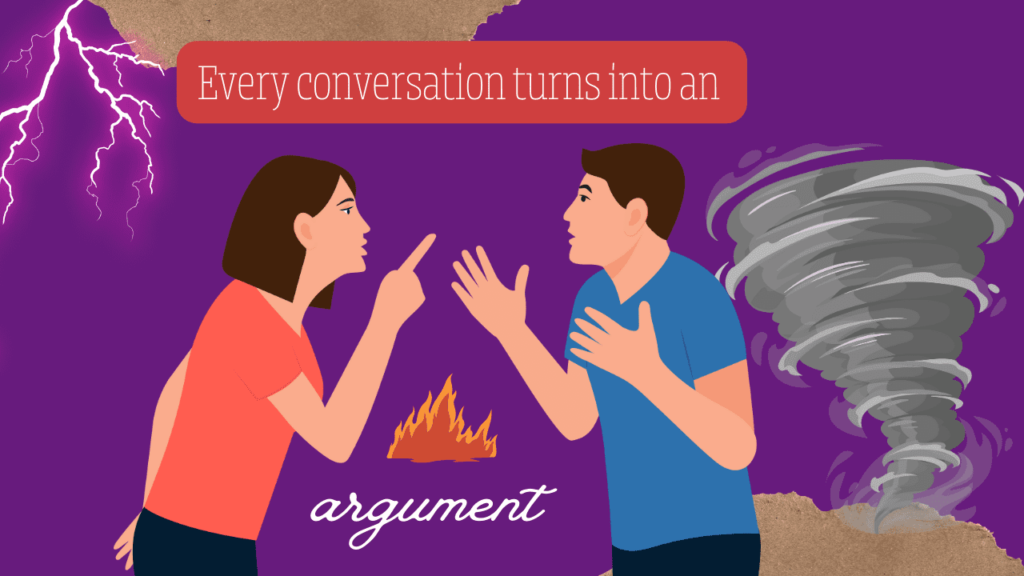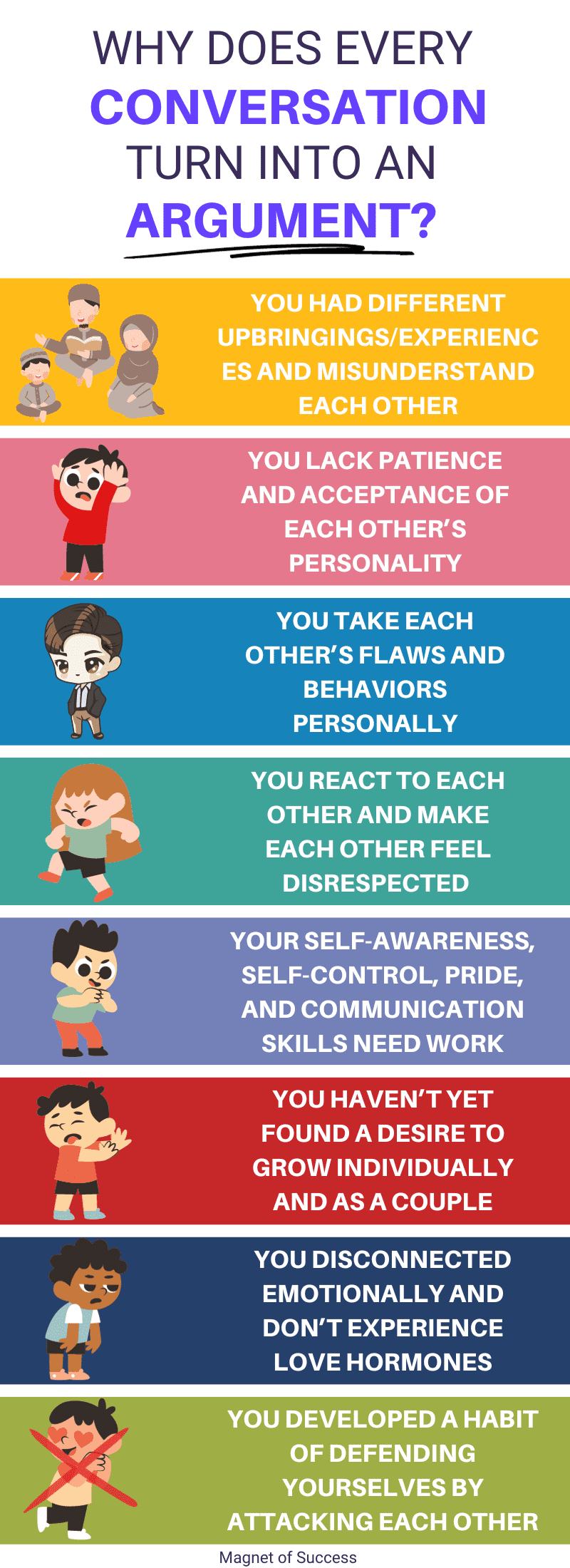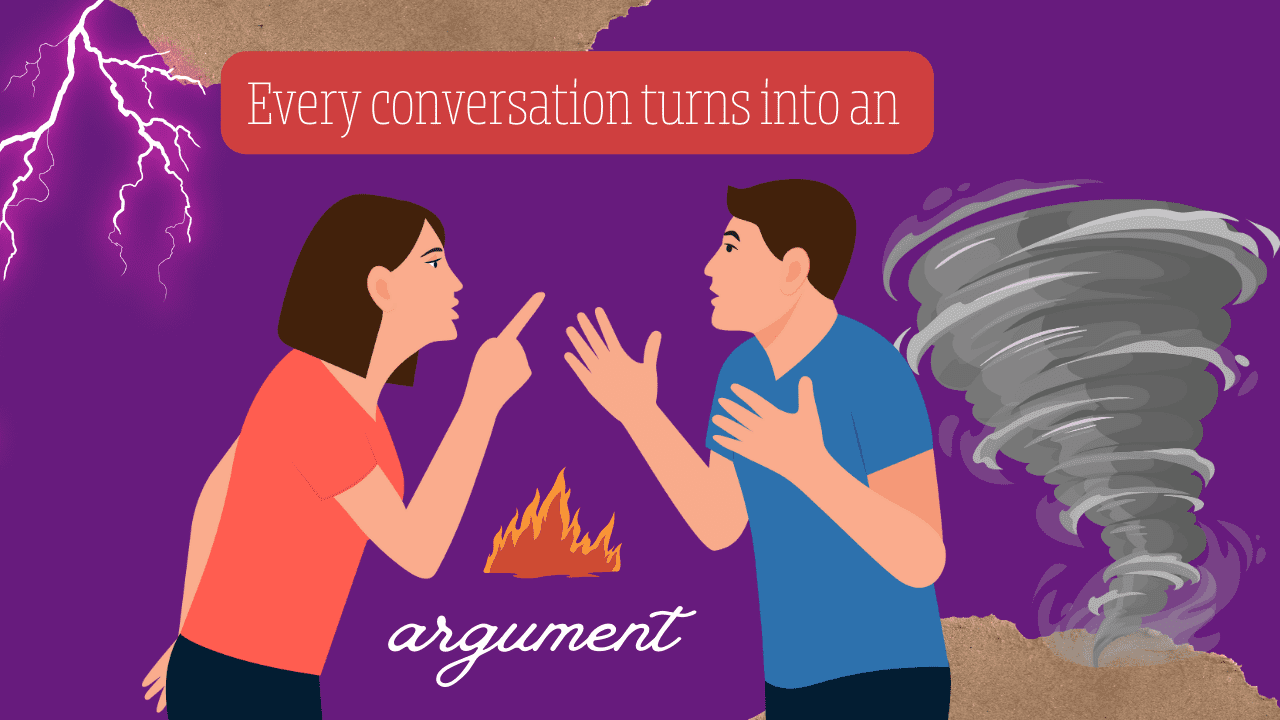When every conversation turns into an argument, it’s evident that your relationship standards have declined. You’ve programmed yourselves in such a way that you react to each other’s attitudes with ego and pride.
This causes you to add oil to the fire and prevents you from solving the disagreement peacefully and lovingly the way couples should.
If you don’t break this habit of impulsively reacting to problems, someone could (and probably will) become resentful or contemptuous and lose feelings and respect. That someone will be the person who feels the most victimized and has the least patience, respect, and care.
The reason why every conversation turns into an argument is that you failed to establish or stick to healthy relationship boundaries. Instead of agreeing on what’s okay to say and do, you kept arguing with each other and developed a habit of defending your beliefs rather than hearing each other out and accepting that you may be wrong and that it’s okay to be wrong.
In relationships, breakups, or friendships, there must be certain boundaries you can’t cross. For example, you must never physically hit a person because the moment you do, you cross the threshold of what’s acceptable and encourage your partner to do the same.
People are reactive beings, so if you show them you don’t care about them and that your attitude toward solving problems stinks, you’ll hurt them and drag them down to your level of maturity. Over time, unresolved issues will get worse and turn into bitterness or even contempt.
You and your partner have the power to prevent the relationship from declining into the abyss. You can keep your relationship healthy. But to do that, you need some self-awareness and desire to have a healthy relationship.
To be honest, setting boundaries is the easy part.
It’s much harder to remember the boundaries and stick to them when emotions run high. Not reacting emotionally requires emotional self-control and a healthy perception of your partner.
You can successfully control your temper 50 times, but if you keep viewing your partner as the culprit and yourself as the victim, nothing will change. Your way of thinking will remain the same, which means that you’ll eventually slip up and fall back into the habit of arguing whenever there’s an issue.
The solution to stop arguing every time you argue is to change the way you perceive your partner’s opinion, beliefs, attitude, mistakes, behavior, and personality. You need to accept your partner as he or she is. When you do, you won’t have to control your anger every time you have a conversation because there will be no anger to begin with.
That’s the difference between putting up with things and accepting them.
So don’t just develop a strong ability to control your emotions. Outbursts, caused by emotions may be destroying the relationship, but there’s an underlying issue that may need even more attention. That issue is your way of thinking and perceiving your partner.
Your mentality needs to change as well so you can reprogram your thinking patterns and consequently, the way you react to situations in which you feel unheard, disrespected, or threatened.
Your partner will, of course, need to do the same. He or she will have to learn the importance of having healthier disagreements, improve perceptions, learn to de-escalate tension, and stop reacting impulsively.
It will take some time, but with willpower and an understanding of what’s at stake, you and your partner have everything you need to break unhealthy habits and save the relationship from falling apart.
In this article, we discuss what it means for your relationship if you quarrel all the time and what to do when every conversation turns into an argument.


Why does every conversation turn into an argument?
It’s perfectly normal to have disagreements with your partner. Having differing opinions and beliefs is a sign that you are both unique individuals with your own sets of experiences. But what’s not normal and healthy for you and the relationship is to let disagreements escalate into heated arguments every time you express your views.
Arguments will cause immense damage to your relationship as they’ll disconnect you emotionally and make you vulnerable to doubts, fears, and temptations to give someone new and different a chance. They’ll destroy your relationship from within and likely lead to an ugly breakup.
If you don’t want to break up, bear in mind that you currently lack the most important skill in your relationship. You lack the knowledge and ability to communicate with your partner. This is worrying because your relationship won’t be fulfilling and probably won’t last without communication.
It will have many highly emotional situations that make you and your partner feel miserable.
Even though you’ll have good days from time to time, they won’t be enough to save your relationship from negativity. That’s because, after every high, there will be an even lower low.
It will wipe away all the positive feelings you and your partner experienced and tell you that you don’t understand each other and aren’t right for each other. In a relationship, it’s the negative moments that determine its fate.
How you handle stressors, disagreements, and various relationship problems determines how happy and successful you are.
So by all means, appreciate the good times. But make sure to actually focus on the things that need improvement. Things such as communication, self-awareness, self-control, and the desire to grow and not break up.
How seriously you take your shortcomings will determine whether you stay together, stay together and keep struggling, or break up.
Communication is the most important skill. If you don’t hone it, don’t expect your relationship to magically improve. Although people grow as they age, significant changes don’t happen when they keep reacting the same way and making the same mistakes.
Growth occurs when people become aware of their flaws and begin working on them. And even then it takes weeks if not months of hard work to change deep-rooted beliefs.
So if you want to know why every conversation turns into an argument, bear in mind that you’re either very different people (had different upbringings or learned different lessons in life), haven’t grown enough before you started dating, or disconnected as a couple.
If you disconnected emotionally, you perceived each other poorly, lowered relationship standards, and developed resentment, defense mechanisms, and unhealthy habits for responding to challenging relationship situations.
You took things personally, became prideful, and reacted to relationship problems instead of learning how to resolve them and then resolve them.
Much like muscles, relationship skills, emotional intelligence, self-awareness, morality, and empathy, are things we have to work on. We aren’t born with them, so expecting our relationship to succeed just because we want it to is absurd.
Relationships require maturity. If we don’t have it and aren’t willing to develop it, it’s only a matter of time before we do relationship-destructive things that hinder our happiness and well-being.
It’s only a matter of time before arguments become so frequent that they become our new way of solving difficult situations.
So keep in mind that every conversation turns into an argument because you developed a habit of solving predicaments with your emotions. The moment you feel attacked, you subconsciously remember how you dealt with problems the last time, get angry and defensive, and show your partner not to mess with you.
This infuriates your partner and makes him or her do the same to you. As a result, you find yourselves in continuous arguments, bickering about things that don’t even matter.
Bear in mind that most couples don’t break up because they can’t agree on important matters such as kids, marriage, money, and goals. They break up because they argue about many little unimportant things, such as whose turn it is to take the trash out.
Due to poor communication and problem-solving skills, they drift apart and become tired, ungrateful, and perhaps even bitter and vengeful. This depends on how they perceive each other and how victimized they feel.
That said, here’s why every conversation turns into an argument.


Why do exes argue every time they talk?
Exes argue every time they talk because they see things from different angles and have different post-breakup expectations. They don’t feel the same way about each other as one of them feels rejected and the other suffocated.
Unmet needs and different expectations then heighten their unprocessed emotions and bring out the worst in them.
Some exes yell and accuse each other of horrible things whereas others want nothing to do with each other. How they treat each other and what they want from each other depends on how peaceful the breakup was and how reliant they are on each other.
So bear in mind that exes argue because there’s bad blood between them. They remember hurtful things from the past and associate negativity with each other.
When the breakup is still fresh, they need more time to process hurt feelings and need for space.
How not to turn every relationship into an argument?
You weren’t born with a six-pack, so don’t expect your brain to be developed to perfection by default either. There’s only so much your parents gave you and taught you that can help you in romantic relationships.
Most relationship skills, you have to learn on your own. And you can do that by engaging in retrospection and realizing your mistakes. Once you’ve realized them, you must then work on them. Write them down on a piece of paper and let yourself know you’re interested in resolving them.
Next to them, write how you felt and why you felt when you made those mistakes. This will give you the reason (not the excuse) for acting on your emotions. And finally, describe how you could have behaved and how you will behave next time you’re in a similar situation.
The more you practice, the more self-aware and determined you’ll become to:
- avoid making the same mistakes
- outgrow your current self
There’s nothing wrong with admitting you’re not as developed and ready for a relationship as you’d like to be.
It takes a lot of courage to admit you’re not perfect. But it takes even more courage to stop feeling sorry for yourself and put the actual work in. You have to learn to think differently and develop a strong desire to act differently.
A simple wish to have a happy/successful relationship is not good enough. Happiness and success are states of mind everyone wants to be in. But sadly, not everyone does. Those who put their self-development on autopilot tend to live passively as they let things happen to them rather than take control of them.
Because of that, they react to problems and break up or divorce.
Hence I encourage you to reflect on your relationship and out-of-relationship behavior. Spend as much time as you can not on blaming yourself but on coming up with healthier solutions to your problems.
To make sure you stick to your self-development plan, ask yourself why you need to evolve. Is it because you love your partner and don’t want to break up? Is it because you don’t want to get hurt and hurt your partner back?
Whatever the reason for growing is, make sure it’s something you absolutely want or better yet, need. A strong yearning to want things to change is an extremely important catalyst for growth. It can be caused by a reminder that failure to grow will lead to a breakup and a lot of suffering.
So know that suffering can be avoided. But you need to put the necessary work in now that you still have a chance. If you wait, chances are you’ll continue to turn every conversation into an argument and become resentful.
When you’re resentful, it will likely be too late to fix things as you, your partner, or both will prefer distance and peace over fixing things. That will be the end of your relationship. So know that time is ticking and that your relationship won’t last or be successful if you keep taking it for granted.
Knowing this should make you feel a sense of urgency that motivates you to make changes quickly.
Most changes that need to happen require you and your partner to work on yourselves individually (not as a couple). You need to figure out how to gain control of your thoughts and emotions. Once you have, you’ll be less reactive and better prepared to deal with relationship problems when they arise.
So work on yourselves and make sure you have a healthy relationship mentality and that you foster no resentment for each other. Only then can you discuss important relationship things with your partner.
Things such as mutual forgiveness, gratitude, triggers, and ways to communicate better and avoid arguments in the future.
When you’ve done the self-work or committed to working on yourself, start by telling your partner what you like about him or her. Remind your partner why the relationship matters to you and that you’re willing to listen and work on the relationship.
That will make your partner feel special and allow you to talk about serious relationship matters. When your partner reciprocates, express the things that bother you. Do this patiently and empathetically so as not to accuse your partner and make him or her defensive.
Avoid saying things like, “You make me feel unimportant” and instead say, “I feel hurt and sad when we fight. And because I feel hurt, I say things I should never say. I want to avoid arguing in unhealthy ways from now on by improving communication. When we argue, I want us to…”
This is when you make plans on how not to react as a couple and introduce healthier ways to deal with difficult emotions and situations.
You can:
- hug each other
- go for a walk and cool off
- say you don’t want to argue
- explain it’s okay to have different views
- apologize for hurting each other
- ask each other how you feel
- forgive each other
- remind each other arguing won’t help anyone and that it’s important to remain level-headed
To recap, identify relationship flaws and politely express things that bother you. Doing so will improve relationship standards, help you bond, and prevent your conversations from turning into an argument.
It won’t be easy to improve your perceptions of each other, control your impulses, and accept each other’s flaws.
But if you manage to do that, you’ll grow as people and romantic partners. In other words, you’ll realize that relationships require two emotionally invested and developed people and that you’re both responsible for maintaining relationship standards and staying in love.
Do your conversations turn into an argument? What makes you and the person in question argue? Let us know in the comments section below the post.
And if you want our help with stopping conversations from turning into arguments, get in touch by signing up for 1-on-1 coaching.






what a good article! I wish I could know you before my breakup! In that way I would understand more about the relationship and breakups before being to late! It’s never too late but now i should implement all my knowledge from the one on one chat and all articles with new people.
Forever grateful for your help Zan ❤️
You’re much wiser now, Linda.
I’m sure you’ve learned a thing or two about relationships and breakups.
Sincerely,
Zan